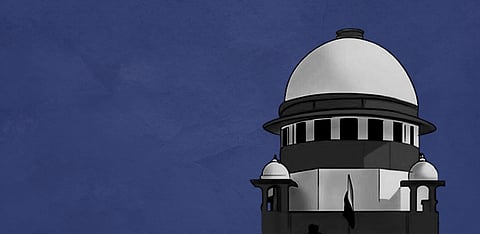

Rejecting the plea by the J&K Administration in the case in which 12 children died of spurious cough syrup in 2019-20, the Supreme Court confirmed that the State was vicariously liable for failing to keep vigil on the medicines sold in its jurisdiction.
—-
THE Supreme Court on Friday dismissed an appeal filed by the Jammu and Kashmir Administration against an order of the National Human Rights Commission ('NHRC') to pay compensation to the families of 12 children who died in Udhampur, Jammu after consuming spurious cough syrups
"Your officers have been found negligent. They ought to have been vigilant. Don't compel us to say things about the food and industry department. The health of citizens is in their hands. They can't play with the lives of citizens. It is their duty to check and verify things," the bench observed orally while rejecting the petition.
The NHRC in September 2020 had recommended a compensation of three lakh rupees each to the kin of 12 children who had died in Udhampur district of the union territory ('UT') of Jammu and Kashmir due to the consumption of spurious cough syrup. The NHRC decision, which was recommendatory in nature, was upheld by the Jammu & Kashmir High Court in March 2021.
Considering that "it was specifically found that the officers of the Drug and Food Control Department were negligent", and therefore "liable for compensation", the Supreme Court said it saw "no reason to interfere with the judgment and order of the High Court."
12 children had died in December 2019 and January 2020 in Udhampur due to consumption of spurious cough syrup. A complaint was filed with the NHRC, and the Commission issued a show cause notice to the UT Administration. Replying to the notice, the UT Administration had submitted that the primary responsibility for paying compensation rests upon the manufacturer of the cough syrup, and not the State.
The NHRC rejected this contention and held the State vicariously liable for failing to keep a vigil on the contents and contamination of medicines sold in the UT. It recommended the State to pay a compensation of three lakh rupees each to the next of kin of the deceased children.
The UT Administration appealed against the NHRC recommendation in 2021 at the high court. The high court, while rejecting the appeal, stated that "until and unless the State is held vicariously responsible for such actions or omissions, the Government or its department would never swing into action effectively so as to control the menace of sale of contaminated or spurious drugs. "
The high court had further observed that "A welfare State cannot escape from the responsibility to compensate for the irreparable loss so caused to the families of the victims due to lapses of the (Drugs And Food Control) Department."
In April this year, the UT Administration finally paid the said monetary relief of Rs. 36 lakhs to the 12 aggrieved families after the NHRC reiterated its recommendations and issued a final reminder to the Chief Secretary, Department of Health and Medication of the UT Administration.
The cough syrup that led to the death of the children in Udhampur contained a contaminant known as diethylene glycol, which was one of the adulterants flagged by the World Health Organization in October this year after a similarly spurious cough syrup killed nearly 70 children in The Gambia, The Tribune has reported.